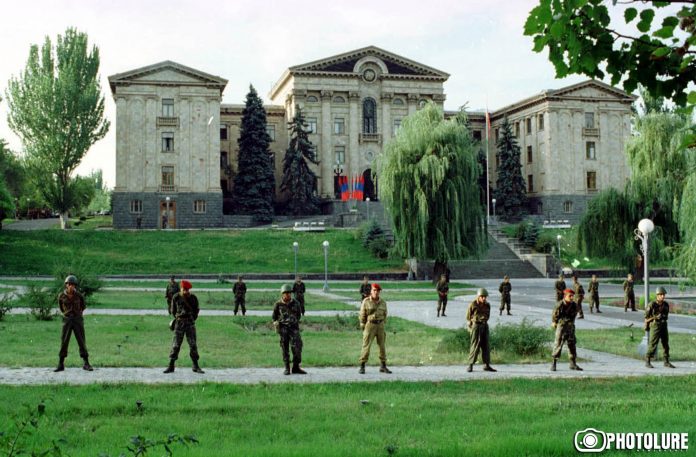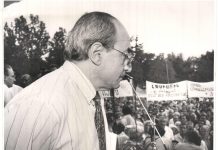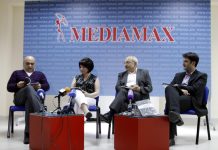The outcome of the September presidential elections, in which incumbent President Ter-Petrossian officially was declared the victor in the first round of balloting with 51.75 percent, was contested by his leading challenger Vazgen Manukyan, who officially garnered 41.29 percent of the vote. Fifty percent of the vote by one candidate was required to avoid a second round of elections. Manukyan’s National Alliance filed an appeal to the Constitutional Court. An OSCE election observer mission noted “irregularities,” “discrepancies,” and “very serious breaches of the election law” which caused “concern for the overall integrity of the election process.”
The final report of the OSCE mission concluded that the breaches in the election law “can only contribute to a lack of confidence in the integrity of the overall election process.” Specific problems during the election process included intimidation; unauthorized persons in polling stations; irregularities in military voting, especially instructions by officers to troops on their voting choice; vote tabulation; verification; and the aggregation of results. Local organizations that observed the 1995 parliamentary elections were not explicitly permitted to observe under the new presidential electoral law. Citing the law’s silence, the CEC refused to allow such observers.
In response to the official election results, opposition candidates Manukyan and Manucharian claimed fraud and appealed directly to the Constitutional Court in late October for new elections. The Court upheld the official election results in late November. Major questions were raised regarding the Court’s procedures in this case. The Central Election Commission refused requests by the opposition and international experts to release the detailed election protocols (voting results) from all voting precincts. The Constitutional Court denied the opposition’s request to publish all precinct results nationwide, confining its review to those precinct results presented by the appellants; 1,155 of a total of 1,596 precinct results were reviewed. To protest this and other aspects of the Court’s treatment of their case, the opposition walked out of the Court’s proceedings prior to its ruling. The Court’s decision rejecting the opposition’s appeal did not dispel doubts about the credibility of the official election results.
Although the Presidential election was flawed, observers agreed that the conduct of the preelection campaign–excluding opposition party media access–was an improvement over the 1995 parliamentary elections. All candidates with sufficient signatures were registered by the CEC. Opposition representatives participated as minority members of electoral commissions in all regional and most precinct and community levels. The opposition campaigned effectively and drew an impressive response from the voters. Checks and balances were enacted into law, which, if implemented, might have addressed many of the suspicions about vote manipulation. Multiple irregularities in the balloting and tabulation process undermined the credibility of the vote and remain a problem. The Government’s failure to address effectively these flaws eroded public confidence in the integrity of the electoral process and remained a source of deep polarization within the country.
Most independent and opposition newspapers operated with extremely limited resources and depended on the Government for publication and distribution facilities — an arrangement that continued intact from the Soviet period. However, the Government has begun to divest itself of the state publishing apparatus and had disbanded the Ministry of Information.
A growing number of printed publications present lively debate and a variety of views. The opposition press regularly criticizes government officials and policies; however, those who report on major corruption or national security issues risk government and other reprisal such as detention, beatings, threats, false prosecutions, and harassing tax audits. The Government provides a list of “forbidden subjects,” and accordingly journalists practice some self-censorship.
During the period following the postelection government crackdown in late September (see Section 2.b.), the opposition press continued to print articles critical of the Government, including reports and analyses written by released opposition figures. However, security forces beat and detained some members of the press after the election. There was no access for the opposition to television or radio after the elections. Troops cordoned off state broadcasting outlets and independent HAI-FM radio station took itself off the air. The opposition’s Hairikhyan was given 10 minutes of airtime in October to announce the postponement of an opposition rally. The new Yerevan Press Club objected strongly to the Government’s restrictive draft press law, which was pulled back for renewed consideration. Armenian media organizations have submitted a new draft press law for government consideration. However, Dashnak party-affiliated media outlets, which were shut down in December 1994, remained closed.
Television and radio broadcasting was largely controlled by the Government. There were 3 functioning independent radio stations and 10 small independent television stations, the latter of which operate largely in the regions outside of Yerevan.
Broadcast media coverage of presidential candidates prior to the September election gave an overwhelming advantage to incumbent President Ter-Petrossian. The Organization for Security and Cooperation in Europe (OSCE) election observer mission noted in its September 24 statement that Ter-Petrossian had 16 times more editorial coverage on state television than his nearest challenger in the weeks prior to the election. According to the OSCE, this “far exceeded what is normal in such contests elsewhere in the world.” State television did, however, provide 90 minutes of free airtime per presidential candidate during the campaign, and provided more balanced coverage than during the 1995 parliamentary elections.












… [Trackback]
[…] There you can find 31713 additional Info on that Topic: vazgenmanukyan.am/en/ter-petrossian-was-re-elected-in-1996-in-a-disputed-election/ […]
… [Trackback]
[…] Read More on on that Topic: vazgenmanukyan.am/en/ter-petrossian-was-re-elected-in-1996-in-a-disputed-election/ […]
… [Trackback]
[…] Read More Information here to that Topic: vazgenmanukyan.am/en/ter-petrossian-was-re-elected-in-1996-in-a-disputed-election/ […]
… [Trackback]
[…] There you will find 164 more Info on that Topic: vazgenmanukyan.am/en/ter-petrossian-was-re-elected-in-1996-in-a-disputed-election/ […]
… [Trackback]
[…] Read More to that Topic: vazgenmanukyan.am/en/ter-petrossian-was-re-elected-in-1996-in-a-disputed-election/ […]
… [Trackback]
[…] Find More here on that Topic: vazgenmanukyan.am/en/ter-petrossian-was-re-elected-in-1996-in-a-disputed-election/ […]
… [Trackback]
[…] Find More Info here to that Topic: vazgenmanukyan.am/en/ter-petrossian-was-re-elected-in-1996-in-a-disputed-election/ […]
… [Trackback]
[…] Read More on on that Topic: vazgenmanukyan.am/en/ter-petrossian-was-re-elected-in-1996-in-a-disputed-election/ […]
… [Trackback]
[…] Find More here to that Topic: vazgenmanukyan.am/en/ter-petrossian-was-re-elected-in-1996-in-a-disputed-election/ […]
… [Trackback]
[…] Here you can find 11532 additional Info to that Topic: vazgenmanukyan.am/en/ter-petrossian-was-re-elected-in-1996-in-a-disputed-election/ […]
… [Trackback]
[…] Information on that Topic: vazgenmanukyan.am/en/ter-petrossian-was-re-elected-in-1996-in-a-disputed-election/ […]
… [Trackback]
[…] Find More to that Topic: vazgenmanukyan.am/en/ter-petrossian-was-re-elected-in-1996-in-a-disputed-election/ […]
… [Trackback]
[…] Find More here to that Topic: vazgenmanukyan.am/en/ter-petrossian-was-re-elected-in-1996-in-a-disputed-election/ […]
… [Trackback]
[…] There you can find 93161 more Info on that Topic: vazgenmanukyan.am/en/ter-petrossian-was-re-elected-in-1996-in-a-disputed-election/ […]
… [Trackback]
[…] Here you will find 71419 additional Information on that Topic: vazgenmanukyan.am/en/ter-petrossian-was-re-elected-in-1996-in-a-disputed-election/ […]
… [Trackback]
[…] There you can find 42480 additional Info on that Topic: vazgenmanukyan.am/en/ter-petrossian-was-re-elected-in-1996-in-a-disputed-election/ […]
… [Trackback]
[…] Info on that Topic: vazgenmanukyan.am/en/ter-petrossian-was-re-elected-in-1996-in-a-disputed-election/ […]
… [Trackback]
[…] Find More on to that Topic: vazgenmanukyan.am/en/ter-petrossian-was-re-elected-in-1996-in-a-disputed-election/ […]
… [Trackback]
[…] Read More here on that Topic: vazgenmanukyan.am/en/ter-petrossian-was-re-elected-in-1996-in-a-disputed-election/ […]
… [Trackback]
[…] There you will find 36948 additional Information on that Topic: vazgenmanukyan.am/en/ter-petrossian-was-re-elected-in-1996-in-a-disputed-election/ […]
… [Trackback]
[…] Find More on on that Topic: vazgenmanukyan.am/en/ter-petrossian-was-re-elected-in-1996-in-a-disputed-election/ […]
… [Trackback]
[…] Info on that Topic: vazgenmanukyan.am/en/ter-petrossian-was-re-elected-in-1996-in-a-disputed-election/ […]
… [Trackback]
[…] Read More Information here on that Topic: vazgenmanukyan.am/en/ter-petrossian-was-re-elected-in-1996-in-a-disputed-election/ […]
… [Trackback]
[…] Find More on on that Topic: vazgenmanukyan.am/en/ter-petrossian-was-re-elected-in-1996-in-a-disputed-election/ […]
… [Trackback]
[…] Read More Information here to that Topic: vazgenmanukyan.am/en/ter-petrossian-was-re-elected-in-1996-in-a-disputed-election/ […]
… [Trackback]
[…] Find More on that Topic: vazgenmanukyan.am/en/ter-petrossian-was-re-elected-in-1996-in-a-disputed-election/ […]
… [Trackback]
[…] Read More to that Topic: vazgenmanukyan.am/en/ter-petrossian-was-re-elected-in-1996-in-a-disputed-election/ […]
… [Trackback]
[…] Read More Info here to that Topic: vazgenmanukyan.am/en/ter-petrossian-was-re-elected-in-1996-in-a-disputed-election/ […]
… [Trackback]
[…] Read More on on that Topic: vazgenmanukyan.am/en/ter-petrossian-was-re-elected-in-1996-in-a-disputed-election/ […]
… [Trackback]
[…] Information to that Topic: vazgenmanukyan.am/en/ter-petrossian-was-re-elected-in-1996-in-a-disputed-election/ […]
… [Trackback]
[…] Find More here on that Topic: vazgenmanukyan.am/en/ter-petrossian-was-re-elected-in-1996-in-a-disputed-election/ […]
… [Trackback]
[…] Information on that Topic: vazgenmanukyan.am/en/ter-petrossian-was-re-elected-in-1996-in-a-disputed-election/ […]
… [Trackback]
[…] Read More to that Topic: vazgenmanukyan.am/en/ter-petrossian-was-re-elected-in-1996-in-a-disputed-election/ […]
… [Trackback]
[…] Info to that Topic: vazgenmanukyan.am/en/ter-petrossian-was-re-elected-in-1996-in-a-disputed-election/ […]
… [Trackback]
[…] Info on that Topic: vazgenmanukyan.am/en/ter-petrossian-was-re-elected-in-1996-in-a-disputed-election/ […]
… [Trackback]
[…] Read More on on that Topic: vazgenmanukyan.am/en/ter-petrossian-was-re-elected-in-1996-in-a-disputed-election/ […]
… [Trackback]
[…] Read More to that Topic: vazgenmanukyan.am/en/ter-petrossian-was-re-elected-in-1996-in-a-disputed-election/ […]
… [Trackback]
[…] Find More Info here on that Topic: vazgenmanukyan.am/en/ter-petrossian-was-re-elected-in-1996-in-a-disputed-election/ […]
… [Trackback]
[…] Read More to that Topic: vazgenmanukyan.am/en/ter-petrossian-was-re-elected-in-1996-in-a-disputed-election/ […]
… [Trackback]
[…] Find More here to that Topic: vazgenmanukyan.am/en/ter-petrossian-was-re-elected-in-1996-in-a-disputed-election/ […]
… [Trackback]
[…] Read More on that Topic: vazgenmanukyan.am/en/ter-petrossian-was-re-elected-in-1996-in-a-disputed-election/ […]
… [Trackback]
[…] Find More Information here to that Topic: vazgenmanukyan.am/en/ter-petrossian-was-re-elected-in-1996-in-a-disputed-election/ […]
… [Trackback]
[…] Find More on to that Topic: vazgenmanukyan.am/en/ter-petrossian-was-re-elected-in-1996-in-a-disputed-election/ […]
Comments are closed.